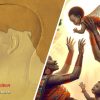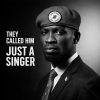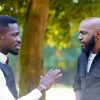Here, as Father’s Day approaches, I am retrieving one of the many portraits of our father I continually carry in my heart and mind and constantly try to live as best as I can the legacy of the good ways and sacred wisdom he and our mother left for us. This is libation in rightful and reverent homage to our father, sacred words and water offered and poured in praise of this special man who, with our remarkable mother, brought me and our brothers and sisters into being and raised us up in the righteous ways and teachings of our ancestors. It is he who taught me and them to be constantly and rightfully attentive to the life and development of the mind, the moral sensitivity of the heart, the anchor and power of the spirit, the health and wholeness of the body, and the remembrance and righteous practice required for the immortality of the soul. And our mother taught us in similar ways and joined and supported our father in all things good and beautiful in our house and family.
Our father was what is called a man of the cloth, a preacher, a practitioner of the ancient art of sharing the sacred word, teaching it as faith and foundation for life and as a sure and certain path and promise of eternal life. His mastery of the art of preaching and teaching the sacred word and of weaving his words into varied patterns of images and insights concerning the Divine and everyday life was for our mother a sign of a divine endowment, a most beautiful gift, and a constant source of joy and pride.
Christian and Baptist by faith, he never forced his faith on anyone, but like our mother, believed that the doing of good was an unsurpassable sermon in itself, a lesson of life that means infinitely more than pro-forma professions of faith. I admired our father for his profound commitment to his faith, the foundation and framework for his deepest thought and daily practice. It undergirded and informed how he looked at and approached the world, did his work, raised his children, related to his wife, interacted with neighbors and strangers, and read and reflected on the signs of the time and of things to come. It was for me a lesson on standing firm on solid moral and spiritual ground and against bending weakly and willingly in the winds of fads, false faiths and current fashion.
Our father taught us too the virtue and value of constant striving to be our best and to achieve and sustain excellence in whatever we do. For him, moral excellence preceded and undergirded all else, for he saw it as the indispensable basis for developing and expanding the self and safe guarding and saving the soul. He conceded that as human beings, we could not keep all the Divine commandments all the time. But he maintained that we must be humble and truthful enough to admit this inability and yet be conscientious, committed and courageous enough to keep trying. For, he taught us, it is through our constant striving that we achieve and sustain excellence, in spite of our human imperfections, failings and faults. And he urged us to remember that what is required of us is not perfection, but excellence and that this can only be achieved by constantly striving to become and be the best of what we can and ought to be.
I also admired the agility and incisiveness of my father’s mind, the way he could, in a conversation or a sermon, lay out ethical lessons in an engaging and insightful language, interpret scriptures with clarity and compelling reasoning, and discover multiple meanings in a word, phrase or simple sentence. And he encouraged and challenged us to cultivate our capacity for insightful understanding and communication of a similar kind. Like our mother and the men and women of their prior and current generation, our father placed great value on education. But he stressed the need for education beyond the book, itself – one useful in making a good living and living a good life, and always in the service of our people and their constant struggle for freedom, justice and vindication.
I loved also our father’s spirit: confident but not arrogant; assertive but not aggressive; convinced of the rightness of his own faith with no need or desire to demean others; believing in the good, but not gullible; ever-ready to give respect, but insisting that it be mutual. He was what was called a “race man,” deeply and defiantly committed to the Black community, to its defense and development in the fullest sense, and holding faith, knowledge, work and service, especially to the needy, as the cornerstones of that commitment.
Our father’s love for our mother was also a lesson and joy for me. They had married early, and literally built their first house together through his initiative as proof of his love and eager acceptance of responsibility, both to her and their parents. They brought into being and raised fourteen children. I was the seventh son and fourteenth child, and our father, like our mother, believed there was a sign in this and that I had a special obligation to take it seriously, serve our people and do something of great value for the race. And they supported me in countless ways in this striving and struggle.
Our father and mother had become farmers and farm workers as they made their way from North Carolina and Virginia to the eastern shore of Maryland where our youngest sisters and I were born. And whether working in the fields or walking in the woods, they talked about the beauty, bounty and the goodness of the earth and our need to respect and appreciate it as a mighty and magnificent work and gift of the Divine. They taught us also to look for and listen to signs and sounds in nature, to watch the beautiful ways of the wind over fields and trees, to read the language of leaves and flowers, and to understand flocks of birds leaving and coming as winter on its way.
Our father was, thus, a unique and special man and I learned from him at every opportunity, whether working in the fields, walking in the woods, or sitting around the table talking about matters of school, narratives of the past, conditions of the day, hopes for the future, sin and salvation, the meaning of manhood, and righteous ways to understand and assert ourselves in the world. And so whatever good I’ve done, whatever excellence I’ve achieved, and whatever useful service I’ve given, is rooted in and reflective of the foundation he and our mother have given me and us to build on.
Moreover, what I develop and teach as Kawaida, Maat or Ifa contains the teachings, interpretative insight, intellectual discipline and value emphasis our father and mother first taught us. Therefore, my words contain their voices, my vision includes their thoughts and hopes for me, our family, our people and the world; and my work and service reflect the values they cherished and left me and us as a legacy that endures in the midst of that which is undermined and overthrown. And at its core is the call and command to seek and speak truth, to do and demand justice, to dare to wage righteous struggle and to walk audaciously in the way of rightness in the world.















